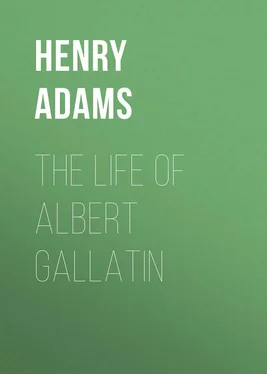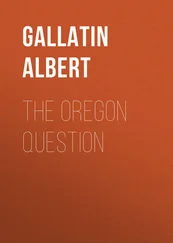Henry Adams - The Life of Albert Gallatin
Здесь есть возможность читать онлайн «Henry Adams - The Life of Albert Gallatin» — ознакомительный отрывок электронной книги совершенно бесплатно, а после прочтения отрывка купить полную версию. В некоторых случаях можно слушать аудио, скачать через торрент в формате fb2 и присутствует краткое содержание. Жанр: foreign_antique, foreign_prose, на английском языке. Описание произведения, (предисловие) а так же отзывы посетителей доступны на портале библиотеки ЛибКат.
- Название:The Life of Albert Gallatin
- Автор:
- Жанр:
- Год:неизвестен
- ISBN:нет данных
- Рейтинг книги:4 / 5. Голосов: 1
-
Избранное:Добавить в избранное
- Отзывы:
-
Ваша оценка:
- 80
- 1
- 2
- 3
- 4
- 5
The Life of Albert Gallatin: краткое содержание, описание и аннотация
Предлагаем к чтению аннотацию, описание, краткое содержание или предисловие (зависит от того, что написал сам автор книги «The Life of Albert Gallatin»). Если вы не нашли необходимую информацию о книге — напишите в комментариях, мы постараемся отыскать её.
The Life of Albert Gallatin — читать онлайн ознакомительный отрывок
Ниже представлен текст книги, разбитый по страницам. Система сохранения места последней прочитанной страницы, позволяет с удобством читать онлайн бесплатно книгу «The Life of Albert Gallatin», без необходимости каждый раз заново искать на чём Вы остановились. Поставьте закладку, и сможете в любой момент перейти на страницу, на которой закончили чтение.
Интервал:
Закладка:
I am sorry, my dear friend, that I cannot go and meet you, agreeable to our appointment; but I am detained here as an evidence in the case of Corbly, and of two more in behalf of the United States, although I know nothing about any of them except Corbly. I lend my horse to Cazenove, who goes in my room, and who will tell you what little has passed since I saw you on the subject of our plan. Upon the whole, I conceive that further emigrations from Geneva will not take place at present, and that our plan will not be accepted in Europe. We must therefore depend merely on our own present number and strength, and this you should keep in view in the course of the examination you are now making. Our own convenience and the interest of those few Genevans who now are here must alone be consulted, and it may be a question whether under those circumstances it will be worth while for you and me to abandon our present situation, and for them to encounter the hardships and hazards of a new settlement in the rough country you are now exploring; whether, on the contrary, it would not be more advantageous for them to fix either in the more populous parts of the State, or even in our own neighborhood, where they might perhaps find resources sufficient for a few and enjoy all the advantages resulting from our neighborhood, experience, and influence.
… You will see in this day’s Philadelphia paper an abstract of the treaty; it is pretty accurate, for I read the treaty itself yesterday. I believe it will be printed at large within a day or two. It exceeds everything I expected… As to the form of ratification I have not seen it, but from the best information I could collect it is different from what has been printed in some papers. It is, I think, nearly as followeth: The Senate consent to and advise the President to ratify the treaty upon condition that an additional article be added to the same suspending the operation of, or explaining (I do not know which), the 12th Article, so far as relates to the intercourse with the West India Islands. If that information is accurate, it follows that the treaty is not ratified, because the intended additional article, if adopted by Great Britain, is not valid until ratified by the Senate, and unless that further ratification takes place the whole treaty falls through. You know the vote, and that Gunn is the man who has joined the ratifying party. I am told that Burr made a most excellent speech… I think fortitude is a quality which depends very much upon ourselves, and which we lose more and more for want of exercising it. Indeed, I want it now myself more than you. I have just received a letter from one of my uncles, under date 23d January, which informs me that Miss Pictet is dangerously ill and very little hope of her recovering. She had not yet received my and your letter. I hope she may, for I know how much consolation it would give her; but I have not behaved well…
Gallatin remained in Philadelphia till July 31, to form a new company, dissolving the old one, and joining with Bourdillon, Cazenove, Badollet, and his brother-in-law, James W. Nicholson, in a concern with nine or ten thousand dollars capital, the business being “to purchase lots at the mouth of George’s Creek,” “a mill or two” in the neighborhood, keeping a retail store and perhaps two (the main business), and land speculations on their own account and on commission. After settling the partnership he remained to buy supplies and to get money from Morris, who at last paid him eight hundred dollars cash and gave a note at ninety days for a thousand. On July 31 he started for Fayette.
… After being detained here two days by the rain, we finally go this moment… I have settled with Mr. Morris… I have balanced all my accounts, and find that we are just worth 7000 dollars… In addition to that, we have our plantation, Mr. Morris’s note for 3500 dollars, due next May, and about 25,000 acres waste lands…
Fayette County, September 6, 1795.… Upon a further examination of Wilson’s estate I have purchased it at £3000, which is a high price, but then we have the town seat (which is the nearest portage from the western waters to the Potowmack and the Federal city, and as near as any to Philadelphia and Baltimore) and three mill seats, one built, another building, and the third, which is the most valuable, will be on the river-bank, so that we will be able to load boats for New Orleans from the mill-door, and they stand upon one of the best, if not the very best, stream of the whole country. The boat-yards fall also within our purchase, so that, with a good store, we will, in a great degree, command the trade of this part of the country. I have also purchased, for about £300, all the lots that remained unsold in the little village of Greensburgh, on the other side of the river, opposite to our large purchase, and 20 acres of the bottom-land adjoining it. It will become necessary, of course, for us to increase our capital… As to politics, I have thought but little about them since I have been here. I wish the ratification of the treaty may not involve us in a more serious situation than we have yet been in. May I be mistaken in my fears and everything be for the best! I would not heretofore write to you on the subject of the dispute between your father and Hamilton, as I knew you were not acquainted with it. I feel indeed exceedingly happy that it has terminated so, but I beg of you not to express your sentiments of the treatment I have received with as much warmth as you usually do, for it may tend to inflame the passions of your friends and lead to consequences you would forever regret. It has indeed required all my coolness and temper, and I might perhaps add, all my love for you, not to involve myself in some quarrel with that gentleman or some other of that description; but, however sure you may be that I will not myself, others may, so that I trust that my good girl will be more cautious hereafter…
Philadelphia, 29th September, 1795.… I arrived here pretty late last night… Since I wrote to you I received the account which I expected, that of the death of my second mother. I trust, I hope at least, the comfort she must have experienced from hearing she had not been altogether disappointed in the hopes she had formed of me, and in the cares she had bestowed on my youth, will in some degree have made amends for my unpardonable neglect in writing so seldom to her… I expect to set off to-morrow.
The dispute between Commodore Nicholson and Mr. Hamilton, to which allusion is made above, was a private one, which, of course, had its source in politics. For a time the commodore expected a duel, and it may well be imagined that to a gentleman of his fighting temperament a duel was not altogether without its charm. Mr. Hamilton, however, had too much good sense to seek this species of distinction. The dispute was amicably settled, and probably no one was better pleased at the settlement than Mr. Gallatin, although he had nothing to do with the quarrel.
Mr. Gallatin’s career as a member of Congress now began, and lasted till 1801, when he became Secretary of the Treasury. In some respects it was without a parallel in our history. That a young foreigner, speaking with a foreign accent, laboring under all the odium of the western insurrection, surrounded by friendly rivals like Madison, John Nicholas, W. B. Giles, John Randolph, and Edward Livingston; confronted by opponents like Fisher Ames, Judge Sewall, Harrison Gray Otis, Roger Griswold, James A. Bayard, R. G. Harper, W. L. Smith, of South Carolina, Samuel Dana, of Connecticut, and even John Marshall, – that such a man under such circumstances should have at once seized the leadership of his party, and retained it with firmer and firmer grasp down to the last moment of his service; that he should have done this by the sheer force of ability and character, without ostentation and without the tricks of popularity; that he should have had his leadership admitted without a dispute, and should have held it without a contest, made a curious combination of triumphs. Many of the great parliamentary leaders in America, John Randolph, Henry Clay, Thaddeus Stevens, have maintained their supremacy by their dogmatic and overbearing temper and their powers of sarcasm or invective. Mr. Gallatin seldom indulged in personalities. His temper was under almost perfect control. His power lay in courage, honesty of purpose, and thoroughness of study. Undoubtedly his mind was one of rare power, perhaps for this especial purpose the most apt that America has ever seen; a mind for which no principle was too broad and no detail too delicate; but it was essentially a scientific and not a political mind. Mr. Gallatin always tended to think with an entire disregard of the emotions; he could only with an effort refrain from balancing the opposing sides of a political question. His good fortune threw him into public life at a time when both parties believed that principles were at stake, and when the struggle between those who would bar the progress of democracy and those who led that progress allowed little latitude for doubt on either side in regard to the necessity of their acts. While this condition of things lasted, and it lasted throughout Mr. Gallatin’s stormy Congressional career, he was an ideal party leader, uniting boldness with caution, good temper with earnestness, exact modes of thought with laborious investigation, to a degree that has no parallel in American experience. Perhaps the only famous leader of the House of Representatives who could stand comparison with Mr. Gallatin for the combination of capacities, each carried to uniform excellence, was Mr. Madison; and it was precisely Mr. Madison whom Gallatin supplanted.
Читать дальшеИнтервал:
Закладка:
Похожие книги на «The Life of Albert Gallatin»
Представляем Вашему вниманию похожие книги на «The Life of Albert Gallatin» списком для выбора. Мы отобрали схожую по названию и смыслу литературу в надежде предоставить читателям больше вариантов отыскать новые, интересные, ещё непрочитанные произведения.
Обсуждение, отзывы о книге «The Life of Albert Gallatin» и просто собственные мнения читателей. Оставьте ваши комментарии, напишите, что Вы думаете о произведении, его смысле или главных героях. Укажите что конкретно понравилось, а что нет, и почему Вы так считаете.












